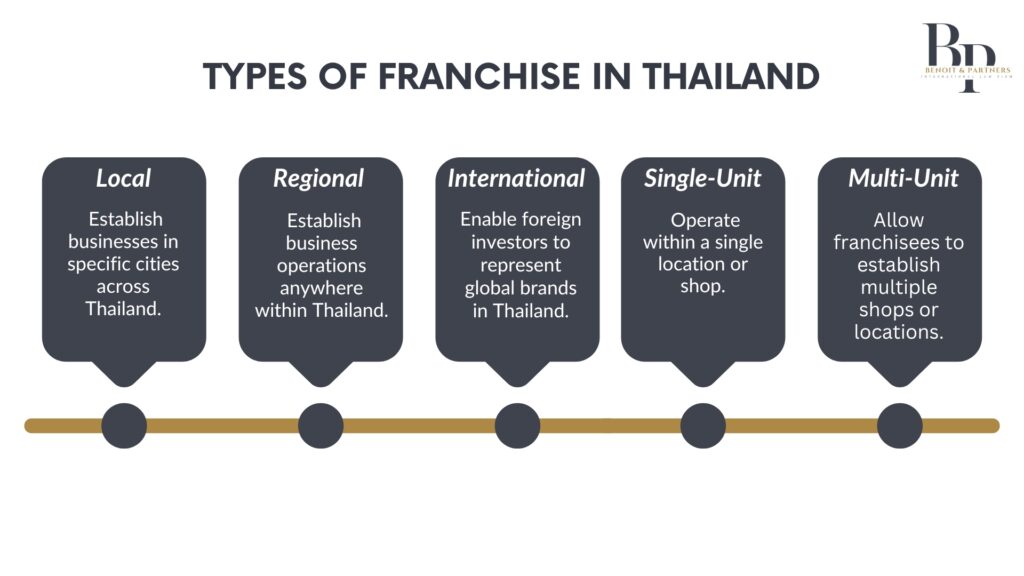Call us now:

How to start a franchise in Thailand ?
Are you considering entering the franchising market in Thailand? With its dynamic economy and growing consumer base, Thailand presents an enticing opportunity for franchise investors. However, it is crucial to have an understanding of the process, legal requirements, and investment considerations for local and foreign investors who are looking to start a franchise in Thailand.
Table of Contents
What are the regulations in Thailand ?
Starting a franchise in Thailand requires adherence to legal frameworks primarily established by the Civil Law and the Commercial Code. Additionally, laws such as the Trademark and Copyright Acts, determine the conditions for work with intellectual property, and the Unfair Contract Law, which has some provisions related to the franchise agreement. Although there are no laws that deal with franchise transactions explicitly, the Civil and Commercial Laws ensure the parameters for franchise agreement, protecting the commercial rights of both parties.
Starting franchise in Thailand opportunities : what are the types ?
When considering starting a franchise in Thailand, it’s essential to understand the various types of franchises available. Here are the types of franchises :

Can foreigners start a franchise in Thailand ?
Yes, foreign investors can own and operate franchises in Thailand. However, it’s essential to understand the legal framework and regulations governing foreign investment in the country. Key points to consider include:
- Foreign Business Act: Compliance with the Foreign Business Act is mandatory for foreign-owned businesses, including franchises.
- Company Registration: Foreign investors must establish a Thai company to operate a franchise in Thailand.
- Visas and Work Permits: Obtaining the necessary visas and work permits for foreign staff members is crucial for compliance.
- Foreign Ownership Restrictions: Certain industries may have restrictions on foreign ownership, necessitating thorough research and due diligence.
What are the legal requirements in Thailand ?
Starting a franchise in Thailand involves navigating a series of legal requirements and procedures. These include:
- Business Registration: Register the franchise business with the Department of Business Development (DBD) under the Ministry of Commerce.
- Licensing and Permits: Obtain business licenses and permits from relevant government authorities, including local municipalities.
- Trademark Registration: Protect the franchise’s intellectual property by registering trademarks with the Department of Intellectual Property (DIP).
- Franchise Agreement: Negotiate and execute a franchise agreement with the franchisor, which delineates the terms and conditions of the franchise relationship.
- Compliance with Labor Laws: Adhere to Thai labor laws and regulations concerning employment contracts, wages, and working conditions.
Opening investment requirements to start a franchise in Thailand
Understanding the financial commitments involved in starting a franchise is crucial for prospective investors. Key investment considerations include:
- Franchise Fees: Initial franchise fees vary depending on the brand and industry, ranging from hundreds of thousands to several million baht.
- Initial Inventory: Budgeting for initial stock or inventory required to launch the franchise operation.
- Lease or Rental Deposits: Securing a suitable location for the franchise outlet and covering lease or rental deposits.
- Equipment Purchases: Acquiring necessary equipment, machinery, and fixtures to set up the franchise.
- Marketing Expenses: Allocating funds for local marketing initiatives and promotional activities to attract customers.
Franchise agreement
A franchise agreement in Thailand is a legally binding contract between a franchisor and a franchisee. This agreement outlines the terms and conditions for starting a franchise, including details on fees, royalties, support provided by the franchisor, territorial rights, and other obligations of both parties. It typically covers aspects such as training, marketing, operational standards, and protection of intellectual property rights.
If you’re considering opening a franchise in Thailand, it’s crucial to comply with the provisions of both the Civil and Commercial Laws. Our lawyers at Benoit & Partners can simplify and expedite the process for you. Our team provides comprehensive guidance on the legal requirements for establishing a franchise in Thailand.
Conclusion
Franchising in Thailand offers strong opportunities for foreign investors looking to expand into Southeast Asia. With a stable economy, growing consumer base, and supportive regulations, Thailand is attractive for franchise operations.
While the possibilities are bright, navigating the Thai legal system is crucial for success. At Benoit & Partners, we’re here to support you at every step—business registration, legal compliance, franchise agreement drafting, and more—so you can focus on making your franchise a true success.
FAQ
Yes, foreign investors can open a franchise in Thailand. However, foreign businesses must comply with the Foreign Business Act, which may restrict ownership in certain industries. It is necessary to register the business and comply with local regulations.
Starting a franchise in Thailand involves several key steps: registering the business with the Department of Business Development (DBD), obtaining the necessary licenses and permits, protecting intellectual property by registering trademarks, and negotiating a clear franchise agreement with the franchisor.
The financial costs of opening a franchise in Thailand include franchise fees, initial inventory, lease or rental deposits, equipment purchases, and marketing expenses. These costs vary widely depending on the brand and business model.
A franchise agreement in Thailand typically includes details on the franchise fee, royalties, territorial rights, franchisor support, training, marketing, and intellectual property protection. Both parties must fully understand and agree to the contract terms.
